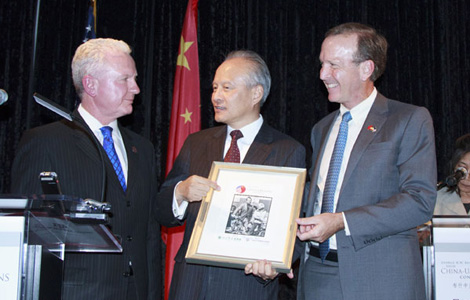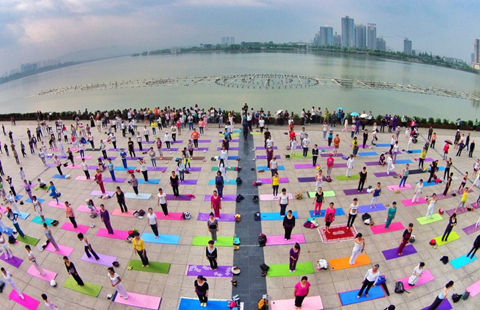China makes fresh efforts to unleash economic vitality
Updated: 2015-05-13 11:01
(Xinhua)
|
||||||||
Central government departments controlled 1,526 approval items in 2013. By the end of 2014, about a third have been canceled or delegated to lower agencies. A total of 205 were abolished last year and another 248 will follow this year.
China's economic growth slowed to 7 percent in the first quarter, the lowest level in six years, and latest indicators pointed to continued weakness in the second quarter, which makes finding new growth more urgent.
By streamlining administration and delegating powers, the country aims to encourage both foreign investors and domestic would-be entrepreneurs, who have long complained that it is hard to get bank loans and bureaucracy makes it difficult to start a business.
Currently, before an investment project is officially approved, a company often needs stamps of approval from more than 30 government departments.
Xu Shaoshi, head of China's top economic planner, has said the number of such steps will be reduced to two to three by the end of 2015.
Meanwhile, thanks to a new business registration policy, which took effect in March last year, the number of newly-founded companies in China surged almost 46 percent year on year to 3.65 million in 2014, with their total registered capital hitting 19.05 trillion yuan ($3.11 trillion), up 99 percent, official data showed.
The country's campaign of cutting red tape has become more detailed with higher efficiency, said Zhang Liqun, a researcher at the State Council's development research center.
He believed the role of government shall be changed from controlling to serving, just as a waiter ready to take orders from people as customers.
Liu Enzhuan, a Tianjin-based FTZ economist, illustrated the meaning of such campaign, citing Chinese tardy customs clearance with fussy red tapes hinder free trade with foreign countries, and only establishing domestic FTZ first with less approvals can help gradually adapt to global rules.
A free trade zone was inaugurated in Shanghai in September 2013 as a testing ground for market policies that reduce government controls and give markets a "decisive" role for allocating resources in the world's second-largest economy.
As of late April, the free trade zone has seen 73,900 registered enterprises, of which more than 16,300 are overseas-funded firms, according to official statistics.

 Chinese buyers spend $116m at art auction in NY
Chinese buyers spend $116m at art auction in NY
 Portrait of a health conference
Portrait of a health conference
 China and Russia hold naval exercise
China and Russia hold naval exercise
 Ten photos you don't wanna miss - May 12
Ten photos you don't wanna miss - May 12
 Students demonstrate new official anti-smoking gestures
Students demonstrate new official anti-smoking gestures
 Wenchuan earthquake: Seven years on
Wenchuan earthquake: Seven years on
 Ten photos you don't wanna miss - May 11
Ten photos you don't wanna miss - May 11
 Man successfully flies homemade plane
Man successfully flies homemade plane
Most Viewed
Editor's Picks

|

|

|

|

|

|
Today's Top News
Kerry off to China ahead of key talks
Beverage battle in China goes beyond colas
Volvo picks South Carolina for plant
Anti-graft body stresses inspections at lower levels
Ex-official on 'most wanted' list is arrested
China, Belarus to boost relations at local level
French president calls for end to US embargo on Cuba
Cook says Apple in talks with Alibaba over Apple Pay in China
US Weekly

|

|







